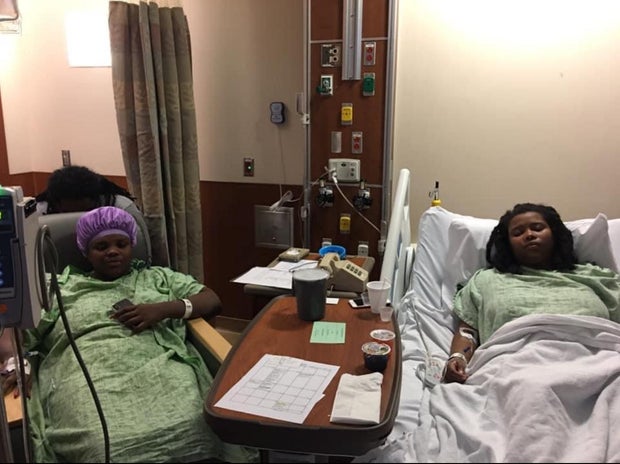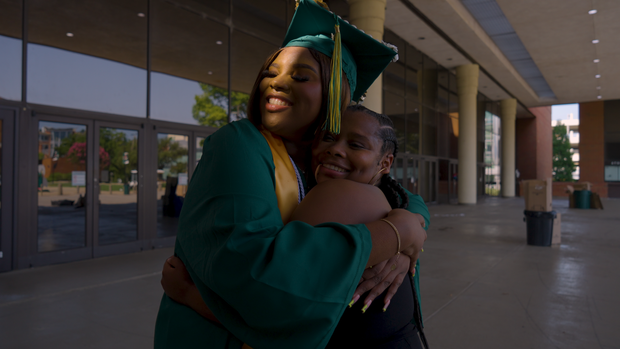As children, sisters Amaris and Dominique Elston were inseparable. Their parents remember the two of them sharing everything and always having each others’ backs, no matter the situation.
That bond didn’t change as they grew older, and when an 18-year-old Dominique was diagnosed with focal segmental
glomerulosclerosis, a chronic kidney disease that soon led to kidney failure, Amaris was again ready to help her sister.
“I told Amaris ‘Dominique is in kidney failure. Her kidney function was at 19%, and she’s going to need a kidney transplant eventually,'” Denise Elston, their mother, said. “Thirty seconds later, Amaris said, ‘Can I give her one?'”
The Elston family
Amaris, then interviewing for medical schools, knew her family had a history of kidney disease, so she wasn’t sure she’d be able to donate. Dominique didn’t want her sister to put her life on hold but as her condition deteriorated and her kidney function dropped to just 5%, despite dialysis treatments, Amaris knew she had to do something. Without telling Dominique, she got tested and learned she was a match.
“She’s my little sister,” Amaris said. “As a big sister, it’s natural to want to jump in and save her from everything that life has to offer, even failing kidneys. I knew this was the best option that she had at getting back on track with life and doing all the things she wanted to do. It was never really a question.”
Avoiding years on a waiting list
About 140,000 people are on the waiting list for a kidney transplant in the United States, according to Dr. Kelly Birdwell, medical director of kidney transplantation at Vanderbilt University Medical Center, who was not involved in the Elston sisters’ care.
The average American waits about five years for a kidney donation through the waiting list. Black Americans are also disproportionately represented on the waiting list, Birdwell said. Black people are more likely to have Type B blood, which has fewer compatible donors, she said, and there is also “an excess risk of kidney disease in the African American population.”
In 2019, more than 14,000 Black kidney transplant candidates were moved up on the national waitlist after it was found a widely-used test was overestimating how well Black people’s kidneys were functioning, making them seem healthier than they were and extending the amount of time they waited.
Amaris said all of those factors were on her mind when she decided she wanted to donate to her sister. In 2023, 21,765 kidney transplants were completed, with 6,294 of those organs coming from living donors. About 60% of living donors are related to the recipient, Birdwell said.
To donate a kidney, interested family members do a round of initial testing that confirms the donor is compatible with the recipient. That’s followed by a longer evaluation, Birdwell explained, to make sure the donation won’t put the potential donor at risk. The evaluation includes bloodwork and imaging to confirm the potential donor is in good health. Once those stages are successfully completed, it’s just a matter of scheduling the surgery.
For the Elstons, that meant waiting until Amaris finished her first semester of medical school at the University of Alabama at Birmingham. In December 2018, the sisters were again side-by-side, waiting for their operations at the University of Vanderbilt’s Transplant Center. Amaris’ operation was first. Birdwell estimates that a donor surgery is about two hours, while a recipient’s surgery, scheduled for later in the day, is about three hours.
When Amaris and Dominique reunited after their operations, the eldest of the two could already see a change in her baby sister.
“I remember laying in the bed and being in a lot [of] pain, and Dominique walking down the hallways like ‘No big deal,’ and in that moment, it solidified that I knew I had made the right decision,” Amaris said. “She looked like a whole new person, in less than 24 hours. She was just bopping in my room, sitting in my chair. It was worth it.”
The Elston family
Working together to save lives
Amaris gave her younger sister more than a kidney. She also gave Dominique the chance to follow her sister into the field of medicine.
Amaris graduated from UAB’s Heersink School of Medicine in 2022. Just two years later, Dominique graduated from the UAB School of Nursing with her bachelor’s degree in nursing. Amaris cheered her on from the audience.
“After going through what we went through, it was kind of like a calling for me to go into (nursing),” Dominique said. “It wasn’t really something I had to think about. I felt like it was something that was meant for me.”
The Elston family/UAB
Now, both sisters are working in the neurology field. Amaris is a neurology resident at the Medical University of South Carolina, and Dominique is a neurology intensive care unit nurse at UAB. The two are the first members of their family to enter the medical field. Though the sisters are now separated by more than more than 400 miles, their bond is stronger than ever.
“It’s been fun having somebody that is with you through everything, because if you want to talk about the bad parts, the good parts, you can,” Amaris said. “It feels good to know that there’s somebody right beside you that can understand how you feel and what you’re going through. We’ve been each other’s best friends amid some of our darkest moments, so this is just another journey that we’re on together.”



